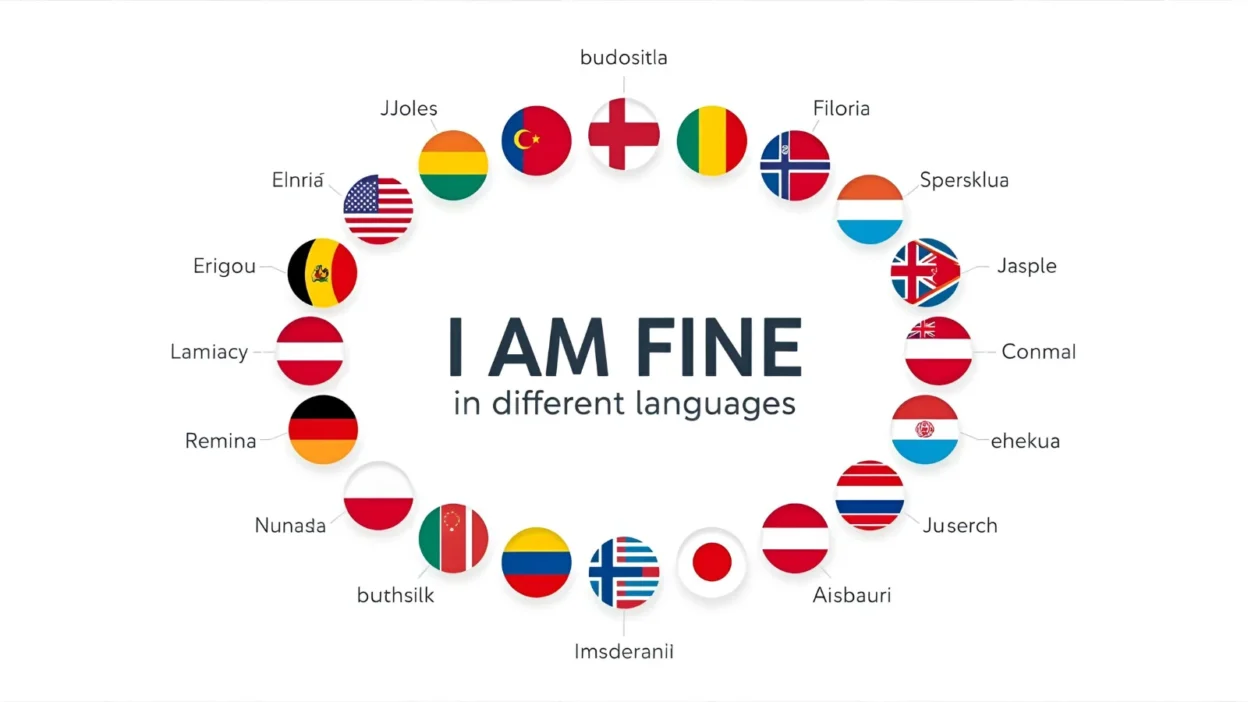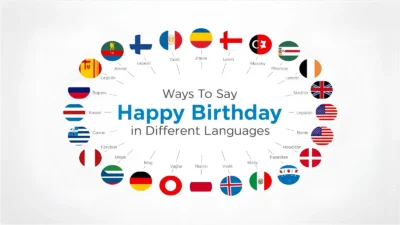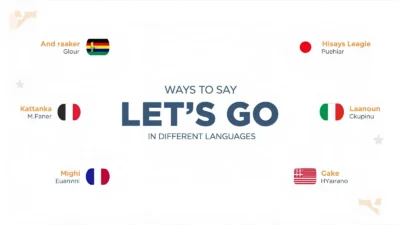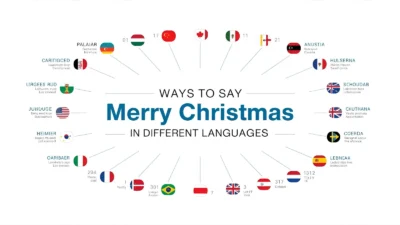When people search for “I am fine in different languages”, they want to learn how to respond politely in global conversations. Saying “I am fine” is one of the most common replies to the question “How are you?”. It reflects positivity, good health, and politeness.
By learning this phrase in 50 different languages, you can confidently greet and connect with people across cultures in a friendly and respectful way.
How to Say I Am Fine in 50 Different Languages
1. English
🇺🇸
Translation: I am fine
Pronunciation: Eye am fain
Meaning: A polite response to “How are you?”
Example: I am fine, thank you.
2. Spanish
🇪🇸
Translation: Estoy bien
Pronunciation: Es-toy Byen
Meaning: Spanish way of saying you’re okay.
Example: Hola, estoy bien.
3. French
🇫🇷
Translation: Je vais bien
Pronunciation: Zhuh Vay Byan
Meaning: French polite response.
Example: Merci, je vais bien.
4. German
🇩🇪
Translation: Mir geht es gut
Pronunciation: Meer Gate Es Goot
Meaning: German phrase for “I’m fine.”
Example: Danke, mir geht es gut.
5. Italian
🇮🇹
Translation: Sto bene
Pronunciation: Stoh Bay-nay
Meaning: Italian way to respond.
Example: Ciao, sto bene.
6. Portuguese
🇵🇹
Translation: Estou bem
Pronunciation: Es-toh Baym
Meaning: Portuguese common reply.
Example: Oi, estou bem.
7. Russian
🇷🇺
Translation: У меня всё хорошо (U menya vsyo khorosho)
Pronunciation: Oo Men-ya Vsyo Kho-ro-sho
Meaning: Russian polite phrase.
Example: Спасибо, у меня всё хорошо.
8. Chinese (Mandarin)
🇨🇳
Translation: 我很好 (Wǒ hěn hǎo)
Pronunciation: Wo Hen Hao
Meaning: Mandarin phrase meaning “I’m very good.”
Example: 谢谢,我很好。
9. Japanese
🇯🇵
Translation: 私は元気です (Watashi wa genki desu)
Pronunciation: Wa-ta-shi Wa Gen-ki Dess
Meaning: Formal Japanese response.
Example: はい、私は元気です。
10. Korean
🇰🇷
Translation: 저는 잘 지내요 (Jeoneun jal jinaeyo)
Pronunciation: Juh-nun Jal Jee-nae-yo
Meaning: Korean polite reply.
Example: 네, 저는 잘 지내요.
11. Hindi
🇮🇳
Translation: मैं ठीक हूँ (Main Theek Hoon)
Pronunciation: Main Theek Hoon
Meaning: Hindi phrase for “I am fine.”
Example: हाँ, मैं ठीक हूँ।
12. Urdu
🇵🇰
Translation: میں ٹھیک ہوں (Main Theek Hoon)
Pronunciation: Main Theek Hoon
Meaning: Urdu polite response.
Example: جی ہاں، میں ٹھیک ہوں۔
13. Arabic
🇸🇦
Translation: أنا بخير (Ana Bikhayr)
Pronunciation: Ana Bi-khair
Meaning: Arabic way of saying “I’m fine.”
Example: نعم، أنا بخير.
14. Turkish
🇹🇷
Translation: Ben iyiyim
Pronunciation: Ben Ee-yee-yeem
Meaning: Turkish polite phrase.
Example: Evet, ben iyiyim.
15. Greek
🇬🇷
Translation: Είμαι καλά (Eimai kala)
Pronunciation: Ee-meh Kah-lah
Meaning: Greek version of “I am fine.”
Example: Ναι, είμαι καλά.
16. Hebrew
🇮🇱
Translation: אני בסדר (Ani beseder)
Pronunciation: Ah-nee Be-se-der
Meaning: Hebrew way of responding politely.
Example: כן, אני בסדר.
17. Dutch
🇳🇱
Translation: Het gaat goed met mij
Pronunciation: Het Khaat Hoot Met Mai
Meaning: Dutch polite phrase.
Example: Ja, het gaat goed met mij.
18. Polish
🇵🇱
Translation: Mam się dobrze
Pronunciation: Mam Shyeh Dob-zheh
Meaning: Polish version of “I am fine.”
Example: Dziękuję, mam się dobrze.
19. Swedish
🇸🇪
Translation: Jag mår bra
Pronunciation: Yahg Mor Brah
Meaning: Swedish casual phrase.
Example: Hej, jag mår bra.
20. Finnish
🇫🇮
Translation: Minulla on kaikki hyvin
Pronunciation: Mee-nool-la On Kai-kee Hu-vin
Meaning: Finnish polite way to respond.
Example: Kyllä, minulla on kaikki hyvin.
21. Norwegian
🇳🇴
Translation: Jeg har det bra
Pronunciation: Yai Har Deh Brah
Meaning: Norwegian way to say “I am fine.”
Example: Ja, jeg har det bra.
22. Danish
🇩🇰
Translation: Jeg har det godt
Pronunciation: Yai Har Deh Got
Meaning: Danish phrase for “I am fine.”
Example: Tak, jeg har det godt.
23. Czech
🇨🇿
Translation: Mám se dobře
Pronunciation: Mahm Se Dob-zheh
Meaning: Czech polite response.
Example: Ano, mám se dobře.
24. Slovak
🇸🇰
Translation: Mám sa dobre
Pronunciation: Mahm Sa Doh-bre
Meaning: Slovak casual phrase.
Example: Ďakujem, mám sa dobre.
25. Hungarian
🇭🇺
Translation: Jól vagyok
Pronunciation: Yohl Va-gyok
Meaning: Hungarian phrase for “I am fine.”
Example: Igen, jól vagyok.
26. Romanian
🇷🇴
Translation: Sunt bine
Pronunciation: Soont Bee-neh
Meaning: Romanian way of responding.
Example: Da, sunt bine.
27. Bulgarian
🇧🇬
Translation: Добре съм (Dobre sǎm)
Pronunciation: Doh-breh Sum
Meaning: Bulgarian casual phrase.
Example: Да, добре съм.
28. Serbian
🇷🇸
Translation: Добро сам (Dobro sam)
Pronunciation: Doh-broh Sahm
Meaning: Serbian way to reply.
Example: Да, добро сам.
29. Croatian
🇭🇷
Translation: Dobro sam
Pronunciation: Doh-broh Sahm
Meaning: Croatian casual phrase.
Example: Da, dobro sam.
30. Ukrainian
🇺🇦
Translation: Я в порядку (Ya v poryadku)
Pronunciation: Ya V Po-ryad-koo
Meaning: Ukrainian phrase for “I am fine.”
Example: Так, я в порядку.
31. Bengali
🇧🇩
Translation: আমি ভালো আছি (Ami bhalo achhi)
Pronunciation: A-mee Bha-lo A-chi
Meaning: Bengali way of responding.
Example: হ্যাঁ, আমি ভালো আছি।
32. Punjabi
🇮🇳
Translation: ਮੈਂ ਠੀਕ ਹਾਂ (Main Theek Haan)
Pronunciation: Main Theek Haan
Meaning: Punjabi casual phrase.
Example: ਹਾਂ, ਮੈਂ ਠੀਕ ਹਾਂ।
33. Gujarati
🇮🇳
Translation: હું સારું છું (Huṁ Sāruṁ Chhuṁ)
Pronunciation: Hoon Saa-room Chhoon
Meaning: Gujarati polite response.
Example: હા, હું સારું છું.
34. Marathi
🇮🇳
Translation: मी ठीक आहे (Mee Theek Aahe)
Pronunciation: Mee Theek Aa-he
Meaning: Marathi casual phrase.
Example: हो, मी ठीक आहे.
35. Tamil
🇮🇳
Translation: நான் நன்றாக இருக்கிறேன் (Naan Nandraaga Irukkiren)
Pronunciation: Naan Nan-draa-ga I-ru-ki-ren
Meaning: Tamil polite response.
Example: ஆம், நான் நன்றாக இருக்கிறேன்.
36. Telugu
🇮🇳
Translation: నేను బాగున్నాను (Nenu Baagunnaanu)
Pronunciation: Nay-noo Baa-goo-naa-noo
Meaning: Telugu phrase for “I am fine.”
Example: అవును, నేను బాగున్నాను.
37. Kannada
🇮🇳
Translation: ನಾನು ಚೆನ್ನಾಗಿದ್ದೇನೆ (Naanu Chennagiddene)
Pronunciation: Naa-noo Chen-na-gi-dde-ne
Meaning: Kannada casual phrase.
Example: ಹೌದು, ನಾನು ಚೆನ್ನಾಗಿದ್ದೇನೆ.
38. Sinhala
🇱🇰
Translation: මම හොඳින් ඉන්නවා (Mama Hondin Innawa)
Pronunciation: Ma-ma Hon-din In-na-wa
Meaning: Sinhala polite response.
Example: ඔව්, මම හොඳින් ඉන්නවා.
39. Nepali
🇳🇵
Translation: म ठिक छु (Ma Thik Chu)
Pronunciation: Ma Theek Chhu
Meaning: Nepali casual phrase.
Example: हो, म ठिक छु।
40. Thai
🇹🇭
Translation: ฉันสบายดี (Chan Sabai Dee)
Pronunciation: Chan Sa-bai Dee
Meaning: Thai polite way to respond.
Example: ใช่, ฉันสบายดี.
41. Vietnamese
🇻🇳
Translation: Tôi khỏe
Pronunciation: Toy Kh-weh
Meaning: Vietnamese phrase for “I’m healthy/fine.”
Example: Vâng, tôi khỏe.
42. Indonesian
🇮🇩
Translation: Saya baik-baik saja
Pronunciation: Sa-ya Ba-ik Ba-ik Sa-ja
Meaning: Indonesian polite response.
Example: Ya, saya baik-baik saja.
43. Malay
🇲🇾
Translation: Saya baik
Pronunciation: Sa-ya Ba-ik
Meaning: Malay phrase for “I am fine.”
Example: Ya, saya baik.
44. Filipino (Tagalog)
🇵🇭
Translation: Mabuti naman ako
Pronunciation: Ma-boo-tee Na-man Ako
Meaning: Tagalog polite response.
Example: Oo, mabuti naman ako.
45. Swahili
🇰🇪
Translation: Niko sawa
Pronunciation: Nee-ko Sa-wa
Meaning: Swahili way of saying “I am fine.”
Example: Ndiyo, niko sawa.
46. Zulu
🇿🇦
Translation: Ngiyaphila
Pronunciation: Ngee-ya-pee-la
Meaning: Zulu casual phrase.
Example: Yebo, ngiyaphila.
47. Afrikaans
🇿🇦
Translation: Ek is goed
Pronunciation: Ek Is Hoot
Meaning: Afrikaans way to reply.
Example: Ja, ek is goed.
48. Amharic
🇪🇹
Translation: እኔ ደህና ነኝ (Ēne Dehna Neny)
Pronunciation: Eh-neh Deh-na Nen-yee
Meaning: Amharic phrase for “I am fine.”
Example: አዎን, እኔ ደህና ነኝ.
49. Hawaiian
🇺🇸🌺
Translation: Maikaʻi au
Pronunciation: Ma-ee-kai Au
Meaning: Hawaiian way of saying “I am fine.”
Example: ʻAe, maikaʻi au.
50. Mongolian
🇲🇳
Translation: Би сайн байна (Bi sain baina)
Pronunciation: Bee Sain Bai-na
Meaning: Mongolian phrase for “I am fine.”
Example: Тийм ээ, би сайн байна.
Conclusion
The phrase “I am fine” is universal and polite, showing gratitude and positivity across cultures. By learning how to say it in 50 different languages, you not only build confidence but also gain the ability to connect with people globally.
This simple response to “How are you?” creates warmth, respect, and understanding. Every culture may say it differently, but the meaning stays the same — you are doing well.
So, whether you’re traveling, working, or making friends online, remember: saying “I am fine” in someone’s language will always bring smiles.



